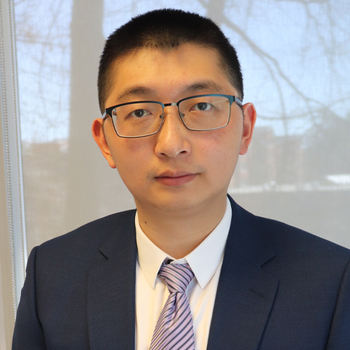There’s a joke, playing on the quantum world’s unique properties, that goes, “There are three types of people in this world: Those who understand quantum computing, those who don’t understand quantum computing, and those who simultaneously do and do not understand quantum computing.” All kidding aside, Weiwen Jiang sees a world in which quantum computing is in widespread use; with new funding from the National Science Foundation (NSF), he is taking steps toward that goal.

Jiang, an assistant professor in George Mason University’s Department of Electrical and Computer Engineering, is leading two recently awarded NSF projects—worth a total $900,000—for work on the development of these complex devices and on building the quantum workforce of tomorrow.
Quantum computers differ from classical computers in that they use elements of quantum mechanics to perform calculations, allowing them to operate much faster and crunch more data. While there are several operational quantum computers in use—IBM and Google are among the top manufacturers—they currently are far from their promised potential and simply cannot yet make the large-scale calculations predicted of them.
Jiang said one key problem is, “They are not ‘stable.’ We can use them for computations, but you might get one answer today and then get an entirely different answer tomorrow.”
Quantum devices are notoriously susceptible to “noise”—specifically, things like cosmic rays, changes in the Earth's magnetic field, radiation, and even mobile Wi-Fi signals. The noise contributes to the devices’ instability.
The $600,000 collaborative grant will fund the work of Jiang and his collaborators from Kent State University in developing an adaptor that will adjust to fluctuating noise, improving the performance of applications on quantum devices. Jiang is well versed on the topic, having recently won the Best Poster Award for “System-level optimizations in improving the robustness of quantum applications on unstable quantum devices” at an event at Oak Ridge National Lab.
According to Jiang’s preliminary works, the deployment of the quantum applications faces several challenges, including sustainability—on one quantum processor, most quantum applications are sensitive to the temporal changes of quantum noise; portability—different quantum processors (even from the same vendor) with specific properties will lead to variation of model uncertainty; and transparency—a lack of visualization tools can block users from tailoring their quantum applications to quantum computers for higher reliability. The NSF project will systematically provide solutions in response to these challenges.
Jiang is optimistic about the future of quantum computing: “Every year, we see a lot of breakthroughs. Just a couple of months ago IBM published a paper on noise reduction. And every year, we see that the number of qubits in quantum computers increases from five in the year 2000 to over 400 on a new computer from IBM.” (A qubit is the basic unit of information used in quantum computing, much like a 1 and 0 for traditional computing.)
Another grant, which Jiang shares with collaborators Mingzhen Tian and Jessica Rosenberg in the College of Science, provides $300,000 from NSF to bolster the quantum workforce pipeline. The grant is for “an end-to-end quantum system integration training program.” The faculty members are developing a new course at Mason, organizing workshops at the IEEE International Conference on Quantum Computing in September (where Jiang is the quantum system track co-chair), and conducting tutorials at international conferences. Recently the team, led by Rosenberg, coordinated a summer immersion program at Mason for high school students. In addition, in the coming months, Jiang will be conducting seminars at a variety of minority-serving institutions in the DC region.
Jiang said the opportunities for quantum-trained engineers are robust and growing. “I have collaborations locally with Leidos and MITRE, for example, and they have needs in this field. Further, we know that quantum will make a difference in everything from finance to drug discovery to machine learning and beyond.”
He is encouraged about the quantum future—both in the world and here at Mason. He stressed that as student demand grows for this technology, “we need to provide the appropriate materials for our students because we’re seeing a lot of strong interest in this field.”
In This Story
Related News
- August 23, 2023
